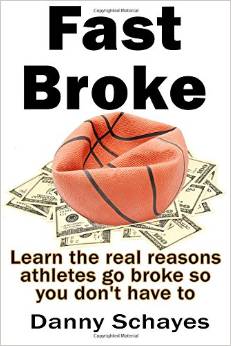 “A fool and his money is one big party!”
“A fool and his money is one big party!”
If you read only one chapter in this book, read this one. It has the answer why so few succeed while most fail miserably.
We have all heard that athletes and entertainers blow all of their money on cars, drugs, jewelry, clothes and women, and not necessarily in that order. We hear every day about all these poor slobs who burn through millions of dollars and are left broke and lonely with no friends or opportunities. They live the obscene high life for a while. But when the money runs out, the friends run out, and the fun runs out. What happened?
How is it possible to go through all that money? The answer is simpler than you think.
 As we look at the person known to investors as “Dumb Money,” we will see why it is the rule rather than the exception. In addition, hopefully you will understand how everyone lives some form of a “Dumb Money” lifestyle and how you can learn from the mistakes of others, rather than your own.
As we look at the person known to investors as “Dumb Money,” we will see why it is the rule rather than the exception. In addition, hopefully you will understand how everyone lives some form of a “Dumb Money” lifestyle and how you can learn from the mistakes of others, rather than your own.
“Dumb Money” is a simple concept. The term refers to anyone who buys liabilities rather than assets. Many of these liabilities are disguised as “investments.” Financial choices are driven more by ego and instant gratification than by design and the need for long-term results. So what does it mean to buy a liability instead of an asset? A liability is anything that costs more than it makes. It can be something you consume (clothes, trips, food, etc.) or something that has depreciating value (jewelry, cars, negative cash flow real estate, etc.).
The term is mostly applied to people who buy or invest in things that they know little or nothing about. They are dependent on others to explain it to them and manage it. They don’t understand what it is or how it works. And most importantly, if it fell to them to manage, they would be totally lost and helpless.
Most investors at all levels fall into the category of “Dumb Money.” They need stockbrokers to pick their stocks. Few have any idea about the companies in which they “invest.” They pour money into mutual funds without the first clue what is in them.
What excuse do you use for this type of investing?
“Who has the time?”
“It’s too complicated.”
“I’m supposed to own stocks, aren’t I?”
These are just a few of the reasons that most people use.
How many real estate investors really know about the risks of owning rental properties? They went to a seminar, or listened to a friend, or know a realtor and – as Los Angeles Clippers announcer Ralph Lawler would say – Bingo! They are a real estate investor! Then they try to fix it, rent it, flip it or something else and learn that the market didn’t do what it was supposed to do.
Or they might have had the worst possible thing happen: They made money the first time but didn’t know how they did it. This is the ultimate recipe for disaster, because you fall into the trap of believing that you know what you are doing or that it is easy. You follow the trail of easy success and get in deeper and deeper until the market goes against you and you don’t know how to fix the deal or trade. That is when the big fly swatter of life crashes down and you learn what it means to be “Dumb Money.”
“Smart Money,” on the other hand, is much more valuable to the success of any investment. “Smart Money” is the combination of capital and the good judgment of the person or entity controlling it. It brings together the value of the money in making a deal happen, with the additional value of advice and connections.
One of the places that you see the value of Smart Money is on the hit TV show “Shark Tank.”
On this show, ordinary entrepreneurs pitch their investment ideas to a panel of extraordinarily successful businessmen and women – including Dallas Mavericks owner Mark Cuban – in an attempt to secure investment from the “sharks.” More often than not, the real value of the partnerships is to match a hard-working entrepreneur who has a great product with a partner who can supply “Smart Money.” Rarely is the money the real benefit for the entrepreneur.
The more important element is the ability of the “shark” to add value by using his business acumen and contacts to get the product on QVC, build a brand, provide legal support or possibly set up manufacturing. The key is that it takes a lot more than money to make a business successful. “Smart Money” makes sound choices about where to invest, then adds greater value in the ability to make a deal prosper.
The goal of any investor – especially an athlete – is to make the transition from “Dumb Money” to “Smart Money.”
Purchase a copy of Fast Broke from Amazon.com for $14.95.
EXCERPT I: WHY PLAYERS GO BROKE
Danny Schayes is a Director of Business Optimization at Intensity and a leader in the business of professional sports. Schayes frequently advises sports organizations in complex business matters that include contract negotiations, pricing strategy, marketing optimization, and executive leadership. Follow him on Twitter.
MORE COLUMNS FROM DANNY SCHAYES:
FORGET MVP: THESE AWARDS ARE BETTER
WATCHING FRANK KAMINSKY WAS LIKE LOOKING IN THE MIRROR
HOW DANNY SCHAYES RUINED PATRICK EWING POSTER NIGHT
NO SMOOTHING MEANS $90 MILLION SALARY CAP, FISCAL INSANITY
DIVORCE COURT FOR COACHES AND PLAYERS: A MAGIC JOHNSON COACHING TALE
NBA’S PIONEERS DWINDLING FOLLOWING DEATH OF EARL LLOYD